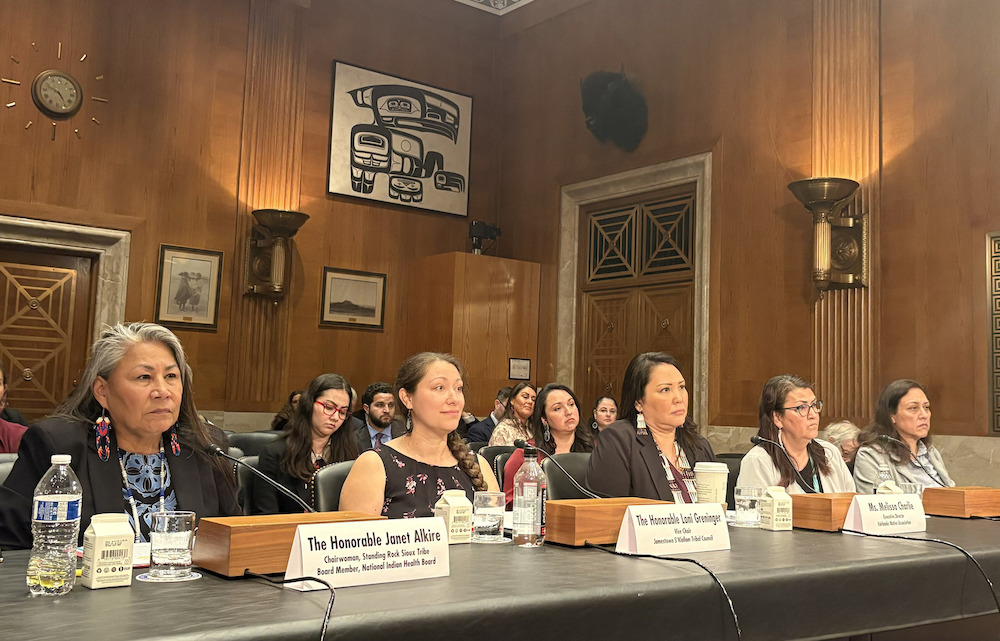
- Details
- By Erin Drumm, Special to Native News Online
WASHINGTON — The Senate Committee on Indian Affairs on Wednesday sounded the alarm on slashed budgets and cut jobs at the Department of Health and Human Services having a devastating effect on Native communities.
In March, HHS Secretary Robert F. Kennedy Jr. announced plans to cut 10,000 employees and centralize agencies across the department. Tribal leaders and advocates say the changes could slow down healthcare operations or result in the elimination of some programs entirely.
The department claims reorganization will make it more efficient. Native and tribal leaders and lawmakers of both parties, however, expressed concern and called for tribal consultation by the agency.
“Let’s be clear, the status quo was already insufficient. The administration’s proposed cuts of nearly a billion dollars to Native health care will make matters worse,” Sen. Brian Schatz (D-Hawaii), vice chairman of the committee, said during an oversight hearing on May 14 at the Dirksen Federal Building.
During the recent reorganization of the department, the Centers for Disease Control and Prevention’s Healthy Tribes program was terminated; the Substance Abuse and Mental Health Services Administration (SAMHSA) lost staff; and regional offices at the Administration for Children and Families serving estimated 458 tribes were consolidated, according to a joint letter to Secretary Kennedy from the committee chairman, Sen. Lisa Murkowski (R-Alaska) and Schatz.
At the hearing, witnesses emphasized the importance of restoring funding for family and mental health services in their communities.
Loni Greninger, vice chairwoman of the Jamestown S’Klallam Tribal Council in Sequim, Wash., said the Administration for Children and Families office serving her region was consolidated with other offices with no warning. Greninger said the office now serving her tribe is located in Denver, some 1,408 miles away. She recommended that HHS rehire the staff who were laid off and said the staff in Denver lacks knowledge of her tribe.
“They don’t know who we are. They don’t know our lands. We need to be able to have people on the ground who know our land, who know our intimate cultural nuances and our political nuances, and that’s what these HHS staff members have been for us, the technical advisors. They help translate our language into your language, so we can access funds that are obligated to us through treaty and trust responsibility,” Greninger said.
According to Murkowski, Kennedy said staff who have been terminated can get new positions at the Indian Health Service; however, Greninger said it was important for all branches of the department to have employees with expertise on Native communities. Many of the programs that serve Native communities are outside of IHS, such as SAMHSA and Head Start, a childhood education and health program for low-income families.
While Murkowski acknowledged that Kennedy protected the IHS from layoffs, she urged him to consult with tribes on other cuts within the department that impact Native communities. Government health care services for Native people are grounded in treaties, federal agreements and the federal Indian trust responsibility.
“These cuts are being carried out without any tribal consultation whatsoever, in plain violation of our trust and treaty responsibilities. It’s not just a moral question of what we owe Native people, it is also a question of the law,” Schatz said.
Efforts have been made to urge Kennedy to consult with Native communities.
In Murkowski and Schatz’s letter to Kennedy on May 9, the lawmakers asked him to consult with American Indian, Alaska Native and Native Hawaiian communities about the impact layoffs would have on their services.
“Tribes share a vision for a healthy America, but tribes must be consulted in the first instance,” said Janet Alkire, chairwoman of the Standing Rock Sioux Tribe in Fort Yates, N.D.
HHS has a Tribal Consultation Policy in place, mandating that it conduct consultation and seek tribal input on policies impacting their communities.
According to Murkowski, Kennedy indicated that health services for Native people were a priority to him, but neither he nor his staff shared plans to consult with Native people.
Erin Drumm is a political reporter in Washington, D.C. for the Medill News Service.
Help us defend tribal sovereignty.
At Native News Online, our mission is rooted in telling the stories that strengthen sovereignty and uplift Indigenous voices — not just at year’s end, but every single day.
Because of your generosity last year, we were able to keep our reporters on the ground in tribal communities, at national gatherings and in the halls of Congress — covering the issues that matter most to Indian Country: sovereignty, culture, education, health and economic opportunity.
That support sustained us through a tough year in 2025. Now, as we look to the year ahead, we need your help right now to ensure warrior journalism remains strong — reporting that defends tribal sovereignty, amplifies Native truth, and holds power accountable.
 The stakes couldn't be higher. Your support keeps Native voices heard, Native stories told and Native sovereignty defended.
The stakes couldn't be higher. Your support keeps Native voices heard, Native stories told and Native sovereignty defended.
Stand with Warrior Journalism today.
Levi Rickert (Potawatomi), Editor & Publisher
